Jonathon’s Story: From Survival to Stability
Living on the streets with my 8-year-old daughter was terrifying. Every day we struggled for water, food, and safety—but the greatest fear was losing her simply because we were homeless.
Living on the streets with my 8-year-old daughter was terrifying. Every day we struggled for water, food, and safety—but the greatest fear was losing her simply because we were homeless.
The Street Medicine Institute welcomes Dr. Qi Charles Zhang as Clinical Director! 
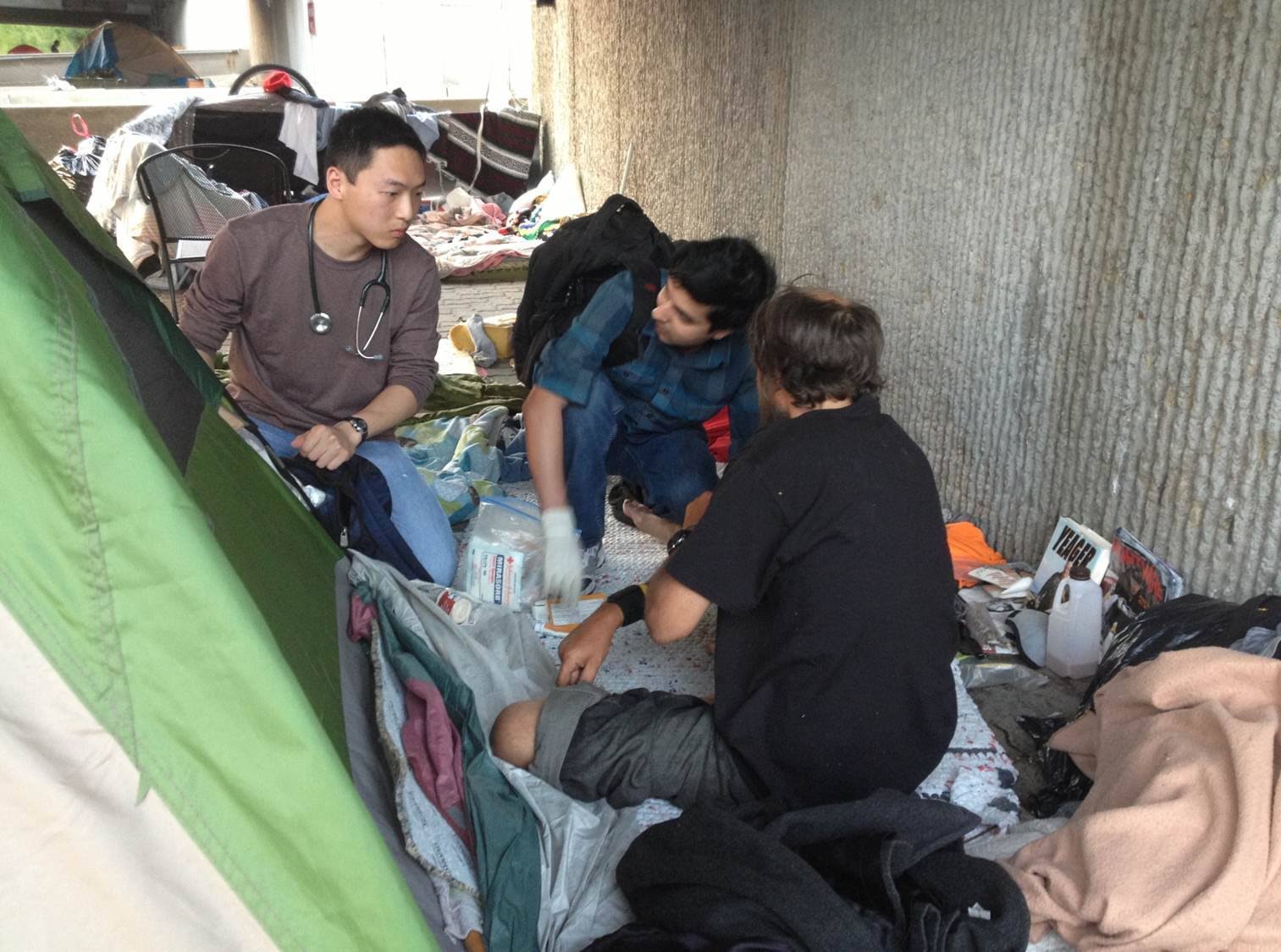
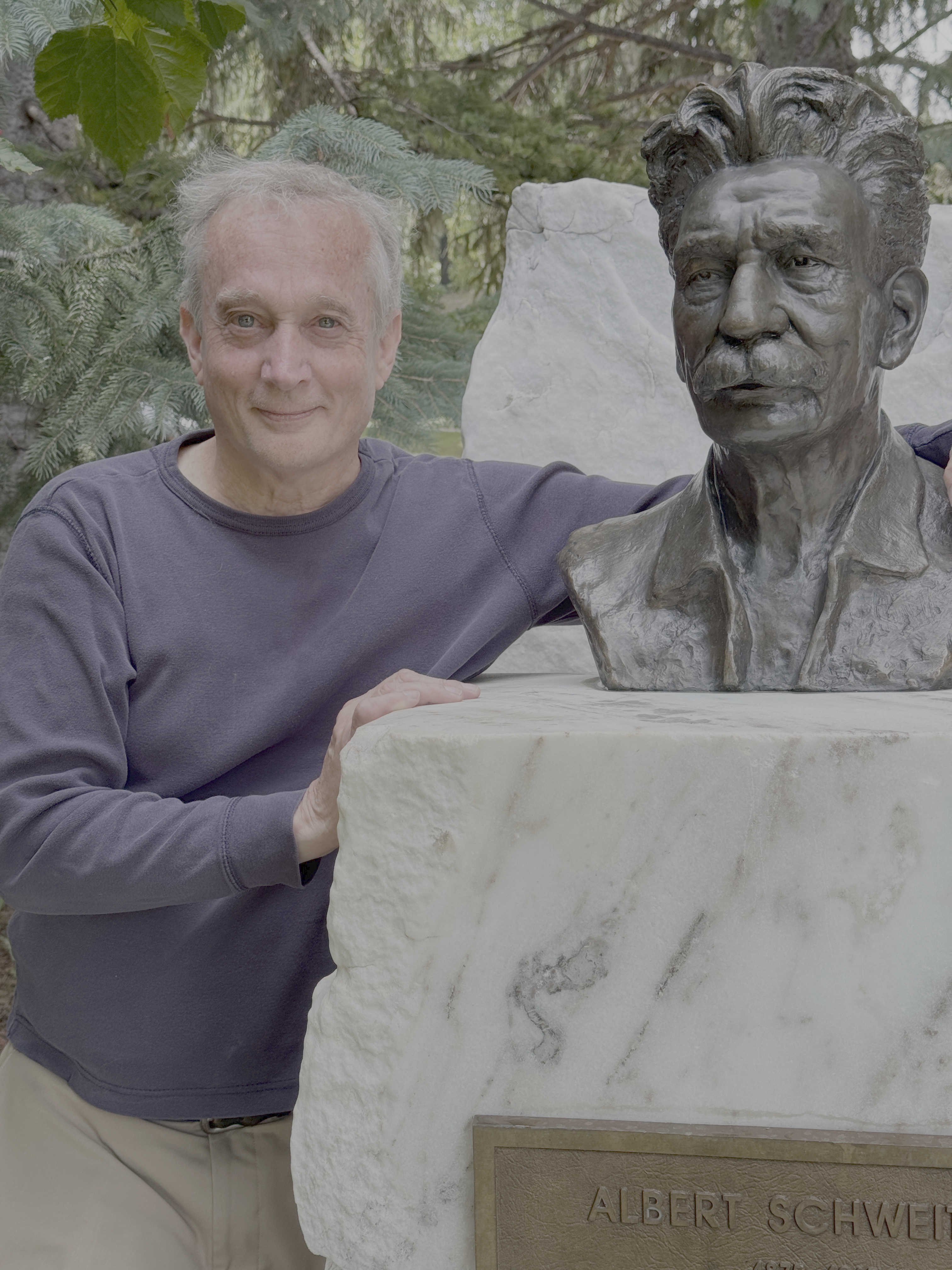 This past June 30th and July 1st, I was given the tremendous honor of being asked to speak in Aspen Colorado to commemorate Dr. Albert Schweitzer’s visit and lecture there in 1949. It was also Albert Schweitzer’s 150th birthday. For those of you not familiar with the great Dr. Schweitzer, he was one of us. His life of service as a physician in a remote clinic in what is now the nation of Gabon embodied his love for those without access to healthcare. With skill and dedication, he created a hospital in the tiny town of Lamberene, initially using an abandoned shed with no electricity or other resources. Earlier in his life, he was a renowned scholar and musician but chose to become a physician in order to more directly serve those in greatest need. Due to his German citizenship, he was captured during WWI, but his patients forced the French to release him to continue his work. In Africa, he had a mystical realization while watching hippos swimming into a river that led him to his philosophy of “Reverence for Life.” His living example and his writings and lectures became an inspiration to the world. Not long after his visit to Aspen (his only visit to the US), he was awarded the Nobel Peace Prize. Dr. Schweitzer was an inspiration to both me and my father, so I eagerly agreed to speak at the event. The more I read not just about Dr. Schweitzer's medical work, but his profound philosophy, the more I recognized the same core values we hold in street medicine. I have experienced, and heard many of you describe, a mystical experience when we see ourselves in the eyes of our sisters and brothers on the streets. My talk attempted to weave our reverence for the reality of those we serve together with Dr. Schweitzer’s Reverence for Life. Indeed, the two are essentially the same.
This past June 30th and July 1st, I was given the tremendous honor of being asked to speak in Aspen Colorado to commemorate Dr. Albert Schweitzer’s visit and lecture there in 1949. It was also Albert Schweitzer’s 150th birthday. For those of you not familiar with the great Dr. Schweitzer, he was one of us. His life of service as a physician in a remote clinic in what is now the nation of Gabon embodied his love for those without access to healthcare. With skill and dedication, he created a hospital in the tiny town of Lamberene, initially using an abandoned shed with no electricity or other resources. Earlier in his life, he was a renowned scholar and musician but chose to become a physician in order to more directly serve those in greatest need. Due to his German citizenship, he was captured during WWI, but his patients forced the French to release him to continue his work. In Africa, he had a mystical realization while watching hippos swimming into a river that led him to his philosophy of “Reverence for Life.” His living example and his writings and lectures became an inspiration to the world. Not long after his visit to Aspen (his only visit to the US), he was awarded the Nobel Peace Prize. Dr. Schweitzer was an inspiration to both me and my father, so I eagerly agreed to speak at the event. The more I read not just about Dr. Schweitzer's medical work, but his profound philosophy, the more I recognized the same core values we hold in street medicine. I have experienced, and heard many of you describe, a mystical experience when we see ourselves in the eyes of our sisters and brothers on the streets. My talk attempted to weave our reverence for the reality of those we serve together with Dr. Schweitzer’s Reverence for Life. Indeed, the two are essentially the same.
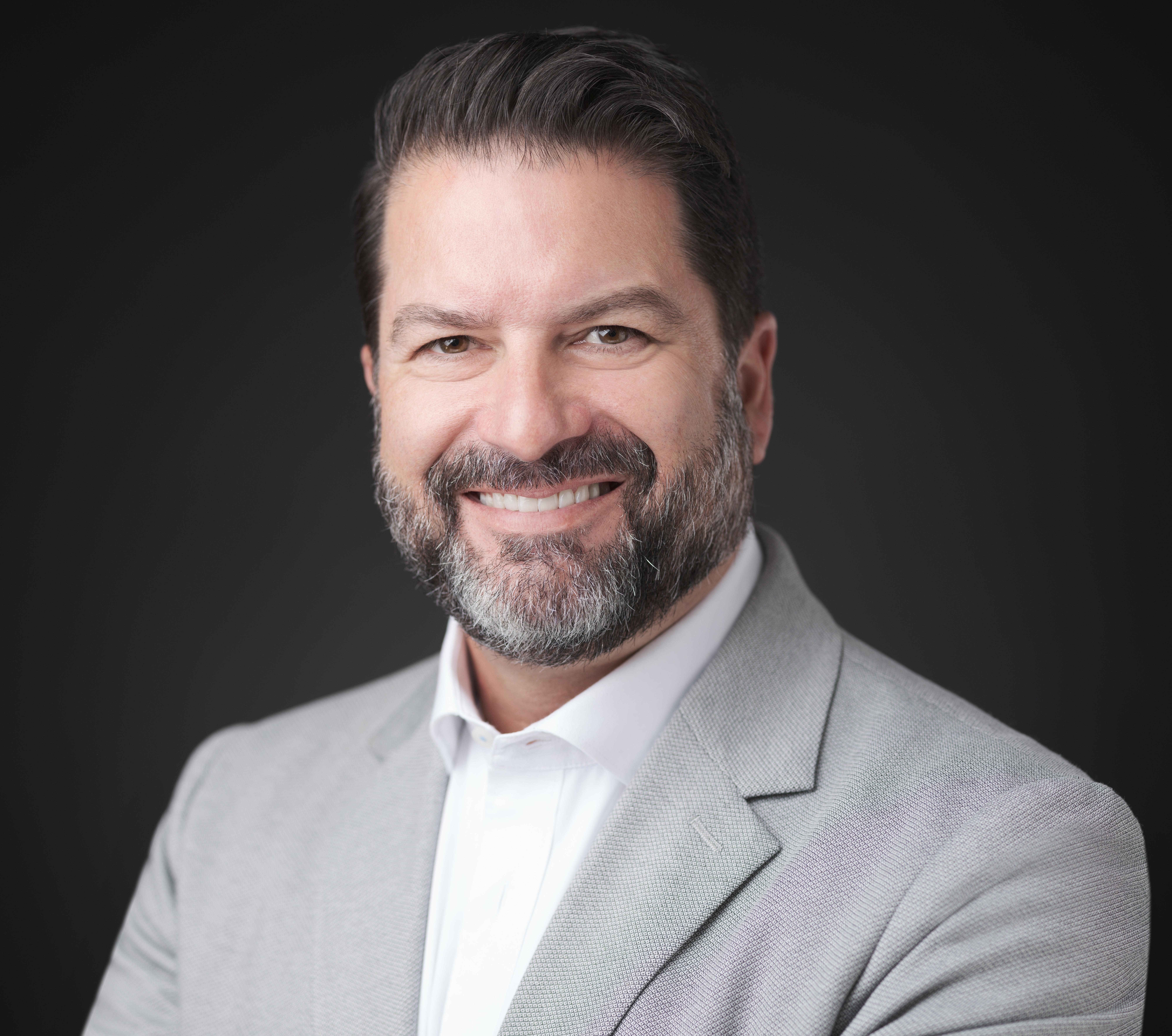 Jeff Olivet is an internationally recognized leader in public health and homelessness policy, with a deep focus on the intersection of housing, healthcare, and racial equity. As the executive director of the U.S. Interagency Council on Homelessness (USICH) from 2022-2024, he led federal efforts to address homelessness as a public health crisis, advocating for policies that integrate healthcare and housing solutions and that prevent homelessness before it starts. He currently serves as Senior Advisor to the Initiative on Health and Homelessness at the Harvard T.H. Chan School of Public Health and a consultant to numerous organizations in the United States and internationally.
Jeff Olivet is an internationally recognized leader in public health and homelessness policy, with a deep focus on the intersection of housing, healthcare, and racial equity. As the executive director of the U.S. Interagency Council on Homelessness (USICH) from 2022-2024, he led federal efforts to address homelessness as a public health crisis, advocating for policies that integrate healthcare and housing solutions and that prevent homelessness before it starts. He currently serves as Senior Advisor to the Initiative on Health and Homelessness at the Harvard T.H. Chan School of Public Health and a consultant to numerous organizations in the United States and internationally.

The Street Medicine Institute’s Seed Grant program furthers SMI’s mission of assisting communities to establish their own Street Medicine programs. The program facilitates and enhances the direct provision of health care to rough sleepers where they live by providing communities and clinicians with expert training, guidance, and support to develop and grow their own Street Medicine programs. We were delighted to have received a record twenty-nine deserving and qualified applications for the fifth year of this grant- evidence that street medicine is expanding across the United States.
SMI’s goal is to assist early stage street medicine programs in the United States – particularly in areas not currently served by street medicine – advance toward a more sustainable level of operation. Supported by the generosity of the Pulte Family Charitable Foundation, two successful grantees will each receive an award valued at over $14,000 to include:
Chastity Bowick is an award-winning activist, civil rights leader, and transgender health advocate. For seven years, she led the Transgender Emergency Fund of Massachusetts, which is the leading crisis agency for transgender communities in Massachusetts. Ms. Bowick launched Chastity’s Consulting & Talent Group, LLC (CCTG) in January of 2023. CCTG’s vision is to uplift and guide the transgender and gender nonconforming communities to be able to live a more adequate life with equal protections & opportunities and to educate everyone who provides services for those community on their needs and wants.

The Street Medicine Institute’s Seed Grant program furthers SMI’s mission of assisting communities to establish their own Street Medicine programs. Now in its fourth year, the program facilitates and enhances the direct provision of health care to rough sleepers where they live by providing communities and clinicians with expert training, guidance, and support to develop and grow their own Street Medicine programs. We were delighted to have received a record twenty-two deserving and qualified applications in 2024.
SMI’s goal is to assist early stage street medicine programs in the United States – particularly in areas not currently served by street medicine – advance toward a more sustainable level of operation. Supported by the generosity of the Pulte Family Charitable Foundation, two successful grantees will each receive an award valued at over $14,000 to include:
The story of SMI Founder Dr. Jim Withers is the subject of a new documentary by director Jeff Sewald. Click here to read more and watch a CBS News Pittsburgh piece on the film.
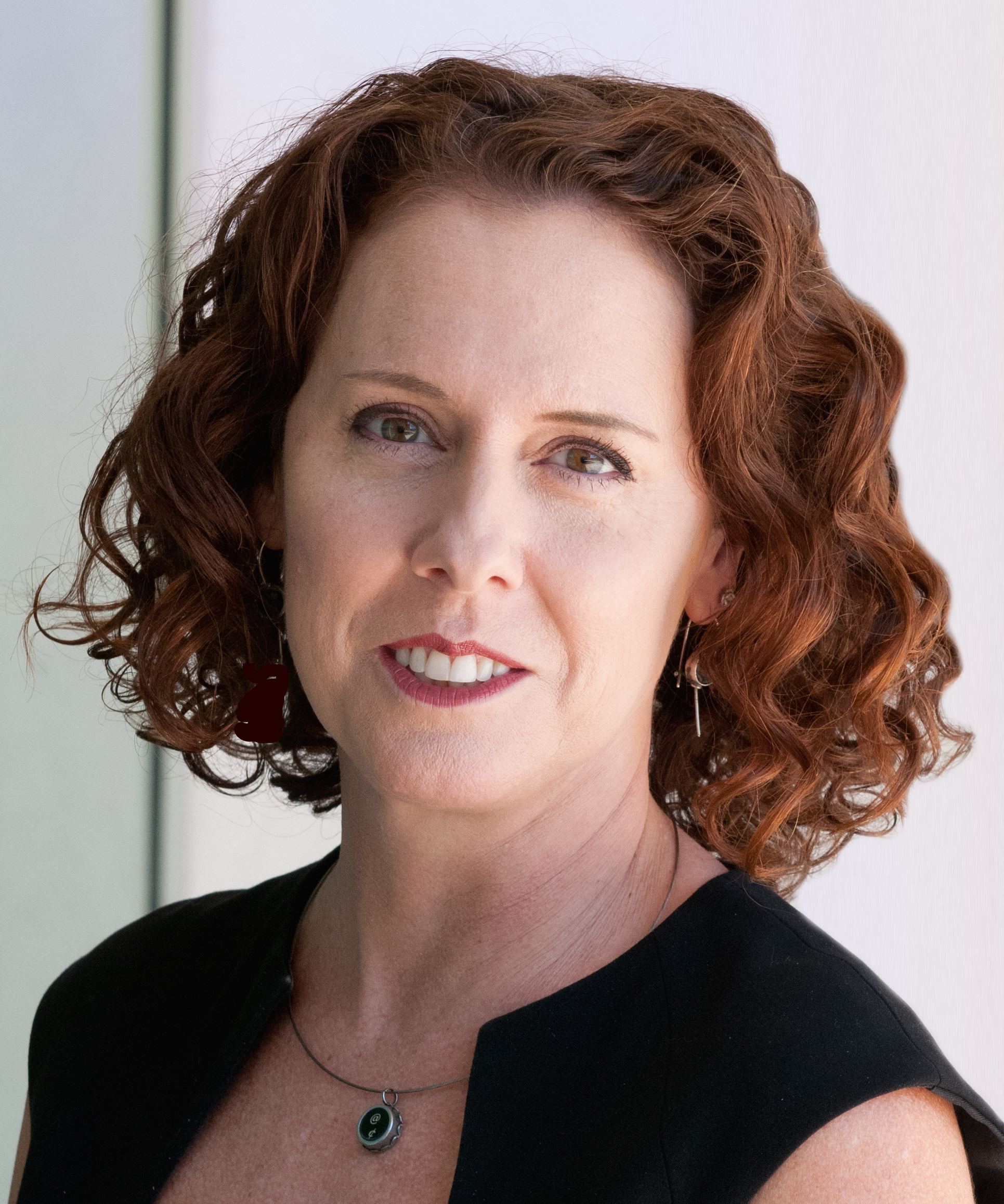 Kendall brings a wide range of executive leadership experience in social services, higher education, and cultural preservation. She began her career directing a shelter program and, since that time, has devoted her efforts to outreach services. Over her career, she has launched numerous programs to reduce barriers, increase inclusiveness, and bring dignity, hope, and support to the places where people need it the most. She has significant experience partnering with the medical community, including working in emergency departments, chairing several regional medical coalitions, and training medical professionals through the American College of Physicians, state medical associations, hospitals, medical schools, offices, and clinics.
Kendall brings a wide range of executive leadership experience in social services, higher education, and cultural preservation. She began her career directing a shelter program and, since that time, has devoted her efforts to outreach services. Over her career, she has launched numerous programs to reduce barriers, increase inclusiveness, and bring dignity, hope, and support to the places where people need it the most. She has significant experience partnering with the medical community, including working in emergency departments, chairing several regional medical coalitions, and training medical professionals through the American College of Physicians, state medical associations, hospitals, medical schools, offices, and clinics.
The Street Medicine Institute has been fortunate enough to have several volunteers make a difference in key projects over the past year. Please reach out to [email protected] if you are interested in volunteering with the Street Medicine Institute!
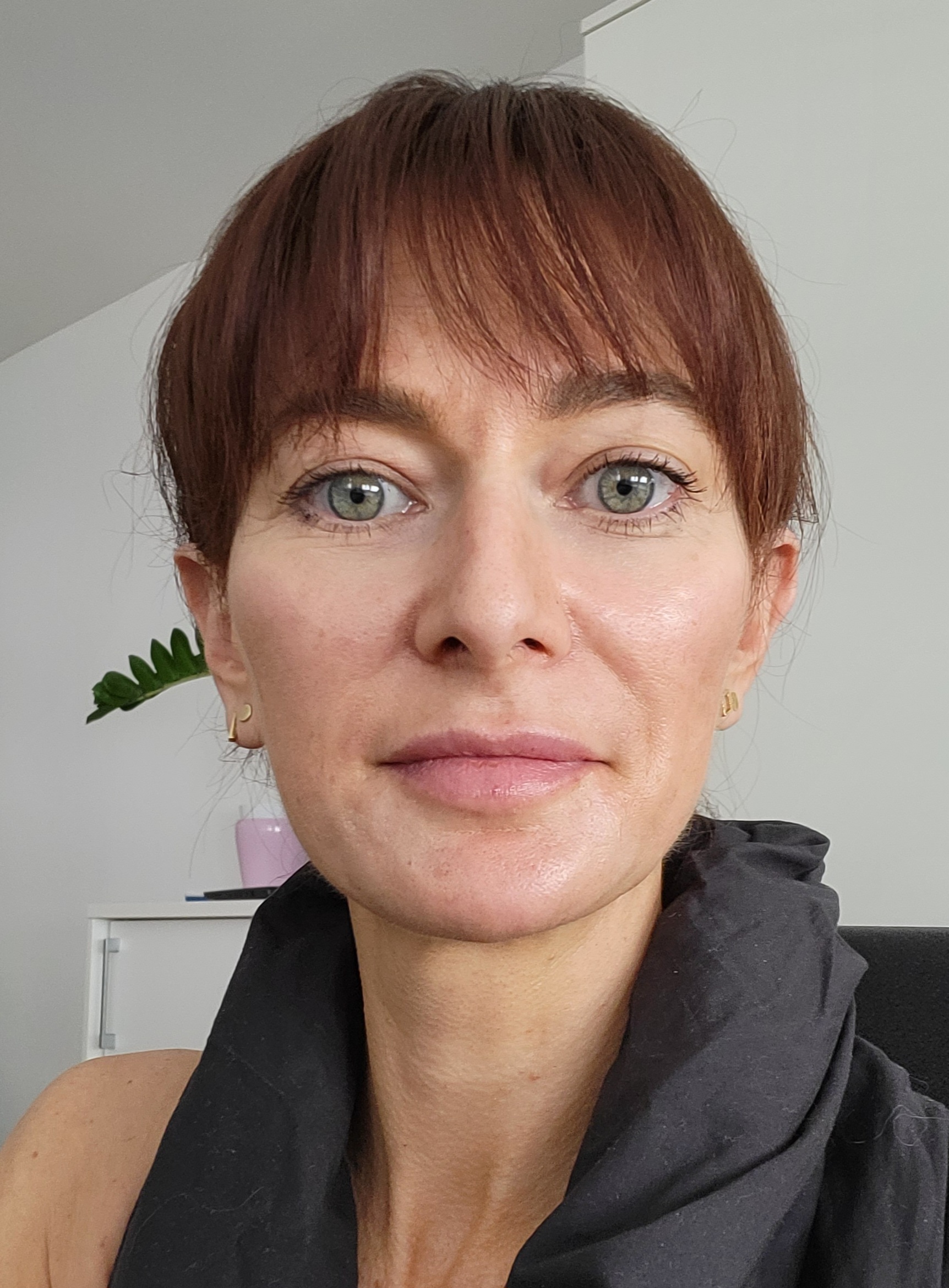 Steph Grohmann is an anthropologist with a background in social care. She has been studying homelessness and displacement for many years. More recently, she has focused on the extreme health inequities affecting people who are considered "out of place," such as people experiencing homelessness and refugees. Wearing many hats, she also works on developing fair and equitable research ethics practices in research with people who are socially excluded. She is the author of The Ethics of Space: Homelessness and Squatting in Urban England. Steph currently works at the University of Edinburgh and the Ludwig Boltzmann Gesellschaft in Austria.
Steph Grohmann is an anthropologist with a background in social care. She has been studying homelessness and displacement for many years. More recently, she has focused on the extreme health inequities affecting people who are considered "out of place," such as people experiencing homelessness and refugees. Wearing many hats, she also works on developing fair and equitable research ethics practices in research with people who are socially excluded. She is the author of The Ethics of Space: Homelessness and Squatting in Urban England. Steph currently works at the University of Edinburgh and the Ludwig Boltzmann Gesellschaft in Austria.
Dear Street Medicine Family, On June 28, 2023, word was received from CMS that a new unique POS code for Street Medicine was issued! It is POS 27 and is already listed on their website.

The Street Medicine Institute’s Seed Grant program furthers SMI’s mission of assisting communities to establish their own Street Medicine programs. Now in its third year, the program facilitates and enhances the direct provision of health care to rough sleepers where they live by providing communities and clinicians with expert training, guidance, and support to develop and grow their own Street Medicine programs. We were delighted to have received fifteen deserving and qualified applications in 2023.
It is with deep sadness the SMI Board of Directors mourns the loss of our colleague and friend, Dr. David Deci. It remains shocking to be thinking of Dave retrospectively - I still find myself wishing to discuss some nuanced matter with him or looking forward to seeing his face on the next zoom call and hearing about his post-retirement life in New England. We invite the SMI community to share your memories and reflections of Dave. These will remain as a memorial to him and to his tireless work for the unsheltered homeless.
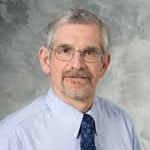 (April 2023) It is with great sadness that we inform the Street Medicine Institute community of the passing of our esteemed colleague, Dr. Dave Deci. Dr. Deci was a dedicated board member who brought passion and commitment to his work, always striving to improve the lives of those experiencing homelessness through street medicine. His contributions to the Street Medicine Institute were immeasurable, and he will be deeply missed. We extend our heartfelt condolences to Dr. Deci’s family and friends during this difficult time. The Street Medicine Institute will honor Dr. Deci’s legacy by continuing to carry out our mission with the same level of dedication and compassion that he embodied.
(April 2023) It is with great sadness that we inform the Street Medicine Institute community of the passing of our esteemed colleague, Dr. Dave Deci. Dr. Deci was a dedicated board member who brought passion and commitment to his work, always striving to improve the lives of those experiencing homelessness through street medicine. His contributions to the Street Medicine Institute were immeasurable, and he will be deeply missed. We extend our heartfelt condolences to Dr. Deci’s family and friends during this difficult time. The Street Medicine Institute will honor Dr. Deci’s legacy by continuing to carry out our mission with the same level of dedication and compassion that he embodied.
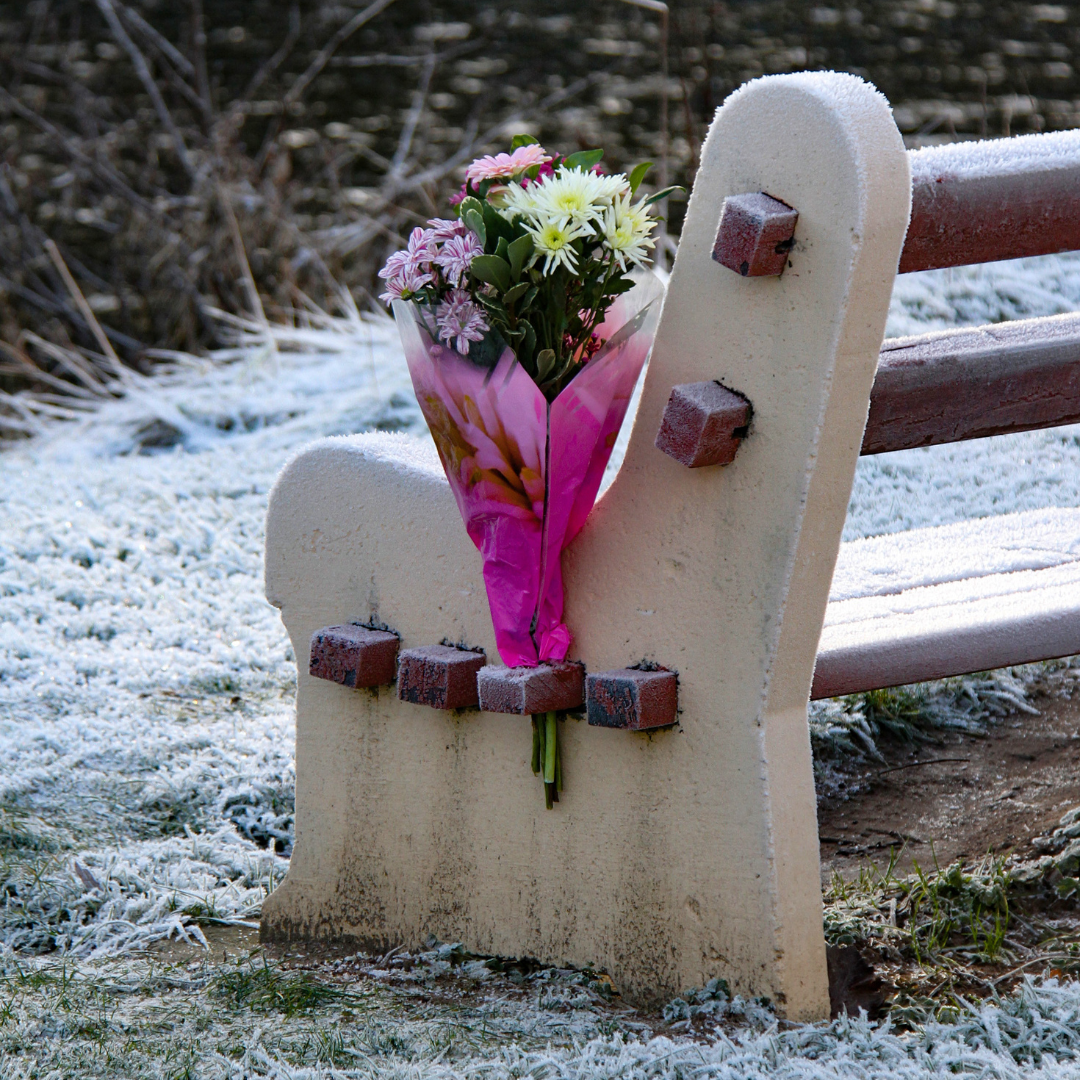 I started thinking about grief in the context of this work when one of our friends from the street died, and I felt like I had no place to put this grief. When a close friend or a family member dies, there is an expected course of suffering. Everyone around you understands what that looks like and there is no explanation needed for why you are grieving. But when one of our patients dies, I felt like I had no box I could put this grief into that would make sense to anyone outside of our work. I couldn’t expect even my friends who work in other areas of health care to understand. Comparative suffering has no place in grief, but I find it to be a natural response. In my community of street medicine providers, I had the sense that I needed “permission” to grieve, and that grief was only acceptable if I really knew the person best or longest or cared about them the most. I didn’t feel as though I was allowed a seat at the grief table if I couldn’t give a reason for being there. In hindsight, I can acknowledge that much of this was my own psyche, but in talking with colleagues I have found that many others felt similarly. So what do we do with this grief? What box does it fit into?
I started thinking about grief in the context of this work when one of our friends from the street died, and I felt like I had no place to put this grief. When a close friend or a family member dies, there is an expected course of suffering. Everyone around you understands what that looks like and there is no explanation needed for why you are grieving. But when one of our patients dies, I felt like I had no box I could put this grief into that would make sense to anyone outside of our work. I couldn’t expect even my friends who work in other areas of health care to understand. Comparative suffering has no place in grief, but I find it to be a natural response. In my community of street medicine providers, I had the sense that I needed “permission” to grieve, and that grief was only acceptable if I really knew the person best or longest or cared about them the most. I didn’t feel as though I was allowed a seat at the grief table if I couldn’t give a reason for being there. In hindsight, I can acknowledge that much of this was my own psyche, but in talking with colleagues I have found that many others felt similarly. So what do we do with this grief? What box does it fit into?
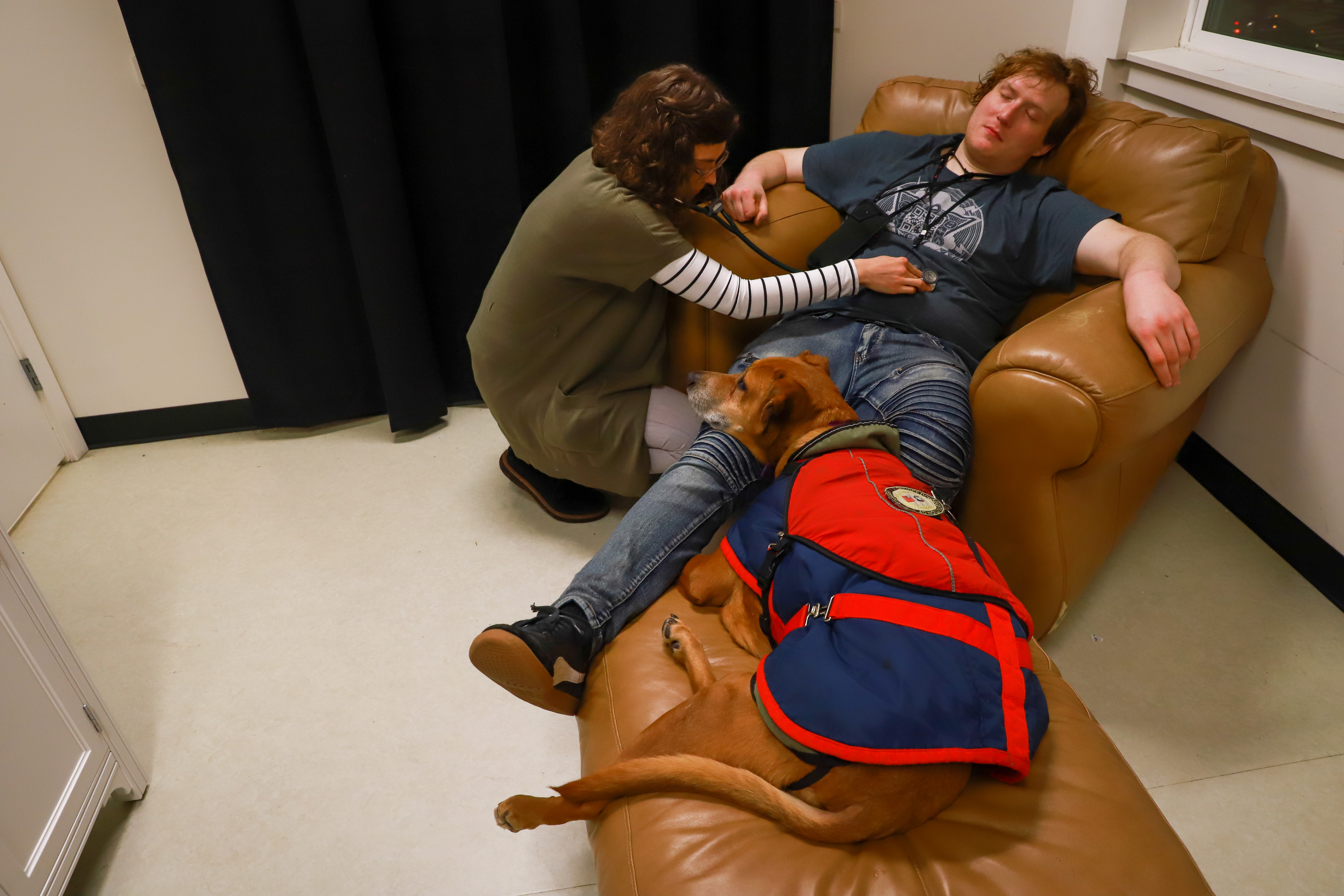 For those of us who work with and within communities experiencing homelessness, we know the value that a companion animal (or emotional support animal or service animal) can have for someone living unhoused. That animal may be the sole trusted companion, and the one who does not judge and loves unconditionally. It may be the one who provides a purpose in life, whether it is something to care for, get out of bed for, or survive for. As someone once told us, “[My pet] is just real happy just to see me exist.”
For those of us who work with and within communities experiencing homelessness, we know the value that a companion animal (or emotional support animal or service animal) can have for someone living unhoused. That animal may be the sole trusted companion, and the one who does not judge and loves unconditionally. It may be the one who provides a purpose in life, whether it is something to care for, get out of bed for, or survive for. As someone once told us, “[My pet] is just real happy just to see me exist.”
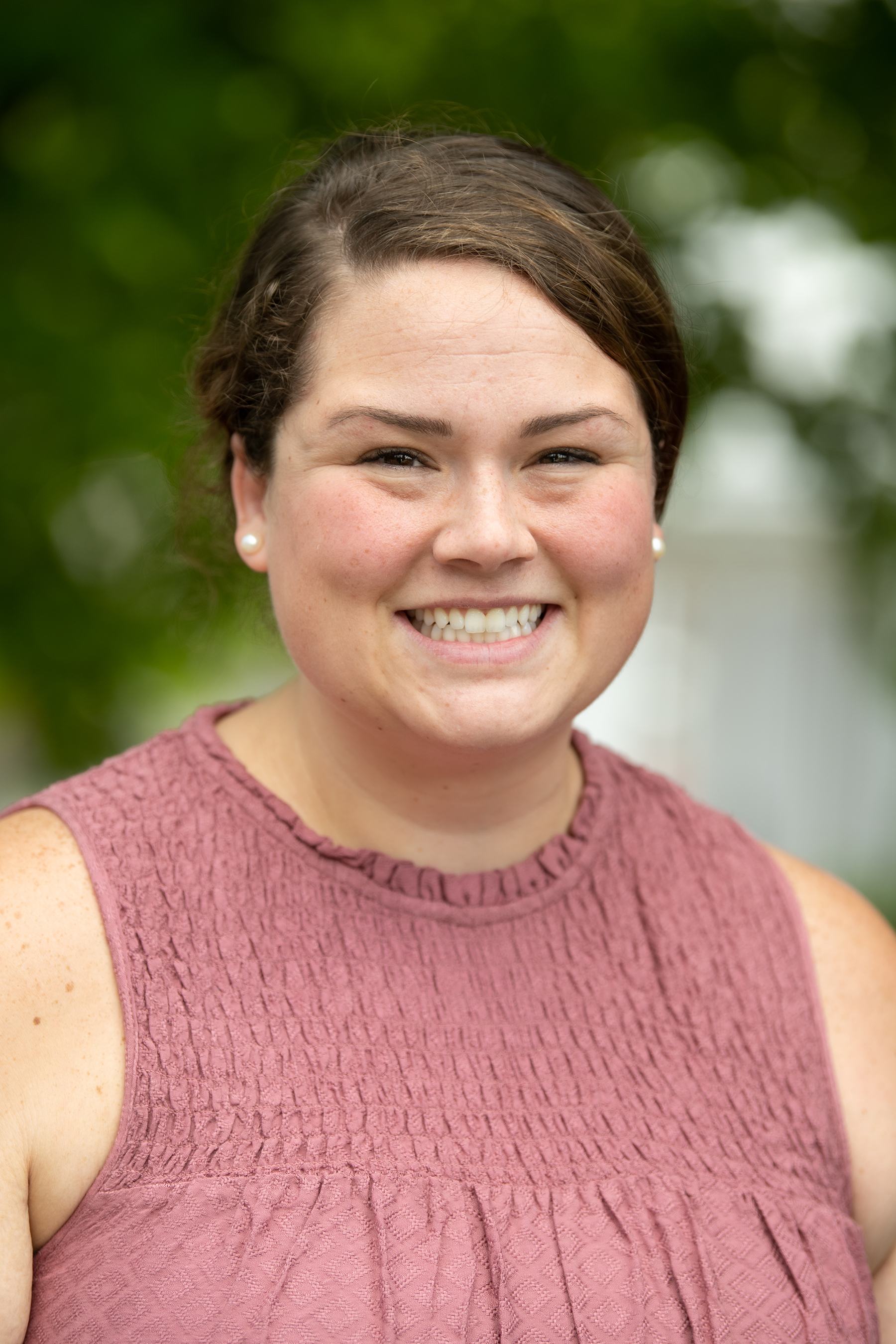 My name is Marisa Charley, and I work and teach in the Shepherd Program for Poverty and Inequalities Studies at a university in Lexington, VA. Our mission is to understand and address the causes and consequences of poverty and inequalities in ways that respect the dignity of every person.
My name is Marisa Charley, and I work and teach in the Shepherd Program for Poverty and Inequalities Studies at a university in Lexington, VA. Our mission is to understand and address the causes and consequences of poverty and inequalities in ways that respect the dignity of every person.